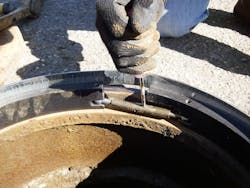“We were having problems in the city with cast iron manhole risers,” says Milwaukee’s Engineer in Charge Samir Amin, P.E. “They’re usually fine, but on occasion they would slip or rattle out, and that led to car damage and claims—there was definitely room for improvement.”
Several years ago, Amin was approached by a representative from American Highway Products, who demonstrated the company’s adjustable riser, the Pivoted Turnbuckle Manhole Riser. These are sturdy galvanized steel risers, precisely sized to order, that feature a turnbuckle. Using a screwdriver as a lever, the turnbuckle transmits 1,000s of pounds of force to the flexible rim, seating the riser into original utility rim securely—installation typically takes five minutes or less.” And unlike risers that depend on set screws or other mechanisms for adjustment, the pivoted turnbuckle riser connects tightly around its entire circumference, like a pressed in bearing.
It seemed like a good idea to Amin, so he organized a pilot project. “We picked a street that’s near our municipal yards, a street that sees a lot of heavy truck traffic,” he explains. “We set several of the adjustable risers there, and just watched over time. They handled heavy loads, and there were no failures or slips, so we were convinced that they would work better than the non-adjustable risers that were being used.”
The city couldn’t specify a particular brand of riser. Instead, Milwaukee wrote specifications for riser use that required adjustable risers with a mechanism similar to the pivoted turnbuckle. That was about four years ago, and the results have been good. “At the very beginning we faced some resistance from contractors, who were used to the readily available cast iron risers,” Amin says. “But really, that went away quickly, and now nobody mentions it.” City crews also install American Highway Products’ risers, including the firm’s catch basin risers, and keep about a hundred risers in inventory for use as needed.
Costs didn’t go up. “Risers aren’t really a big item in most of our mill and fill bids, and I didn’t notice any significant increase in costs due to the required use of adjustable risers,” says Amin.
By now, close to a 1,000 are installed. Milwaukee has emphasized milling and repaving in recent years, and Amin estimates that between 2-300 risers are installed annually. And in all that time, none have rattled out, or failed in any way.
“They’re a successful product, and we’re very happy with them,” says Amin. “They cost a bit more compared to cast iron risers, but now we have no worries about them coming loose, and that means a lot.”
Angus W. Stocking, L.S. is a licensed land surveyor who has been writing about infrastructure since 2002.

